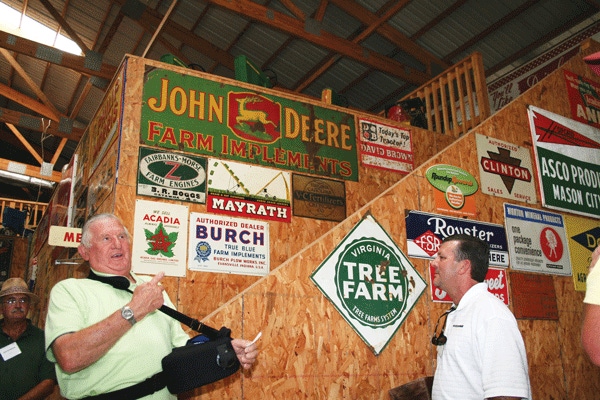March 2, 2011

Charles City, Va., farmers David and Johnny Hula have made a practice of winning state and national yield contests in recent years. Growing high yielding grain crops is their livelihood, but growing ultra-high yielding crops in national competition is more of a hobby.
For their father, Stanley Hula, his hobby is a bit different. David Hula jokes, “I tell him he’s spending my inheritance and he says he’s investing it.”
Stanley Hula’s hobby, though one with the potential to provide farm income, is collecting antique farm equipment and signs. This is not your typical farm collection of antiques — not by a long shot. The elder Hula pursues his passion for collecting things every bit as doggedly as his sons pursue top yielding, competitive grain crops.
He began collecting antique tractors and farm equipment in the late 1990s and in 2003, the Hula family opened Renwood Fields Farm Museum. In 2007, he began in earnest filling up the museum.
“My wife and I collected every item in this room says Stanley Hula, pointing to the main museum showroom. Nothing in here has been restored — it’s all in original condition.” In another wing of the building, Hula notes there are some items under restoration, but none in the main museum.
In addition to the museum, the Hulas have a maze and a petting zoo with some unusual farm animals. The maze is one of only seven like it in the world. It was all done by hand with a hoe — no GPS.
The maze is 2.5 miles of path in a five-acre field. Most people take about 45 minutes to get through it. We have lifeguards to help people who can’t find their way out — and that happens, says Hula.
“Every year we say this will be the last — there just isn’t as much traffic as we had hoped, but seeing the look in the eyes of the 4,000-5,000 people who do come out here, makes it all worthwhile,” he says.
The museum’s showroom is still the centerpiece of Renwood Fields Farm Museum. Upon entering the showroom, one of the first and most impressive things visitors see is the pristine farm signs that cover the walls.
Knew enough to be dangerous
“I had just discovered E-bay about three months before I started collecting farm signs. I knew just enough about electronic trading to be dangerous. The first one I bid on I got. That sign, an original John Deere sign is so rare that only one or two still exist.
“When I got the sign, I just leaned it up against the wall — afraid to open it, because I just knew I had been taken on E-bay.
“The sign, which now adorns one of the main walls in the museum, was in pristine condition. Last year one of the remaining signs like my first E-bay purchase sold for five times what I paid for this one, Hula says.
Every item in the museum has a story. If you can catch Hula there, it’s worth many times the $10 admission fee to hear his stories.
One of the rarest tractors in his collection is a D John Deere, which has turner brakes and a power take off, which makes it collectible.
Probably the most prized of his tractor collection, Hula says, is a BF Avery tractor that was made just before the company was purchased by Minneapolis-Moline. Its original color is what makes it more valuable.
One unique thing about the Avery tractors is how they were marketed. The tractors were only made in 1937 and 1938 — about 4,000 engines were made. They were made for and sold by Sears and Roebuck. “You picked out the tractor you wanted in a Sears and Roebuck catalogue, ordered it, and it was delivered to the nearest train station,” Hula says.
“I bought the BF Avery tractor, and after I bought it, the owner told me he had sold it too cheap. He said, if you’re a man of honor you’ll take your money back and give me the tractor. I said, if you are man of honor you’ll let me have it. He did, and here it sits,” says Hula
Renwood Farms is a history lesson within itself. Started in 1939 and located just off Highway 5, the road on which many of Virginia’s historic plantations sit, the farm is filled with a rich and colorful history.
David and Johnny Hula, who run the farm — mostly they say — continue to stack up national yield awards. This past fall, David Hula won the 2010 National Corn Growers yield award in the irrigated no-till, strip-till category with a yield of 368.44 bushels per acre — the highest overall yield in the national competition.
Visiting the museum, which is not far off I-64, between Richmond and Williamsburg, Va. is a treat in itself. Finding one of the Hulas with time to talk provides some valuable insights on farming past and present.
About the Author(s)
You May Also Like






